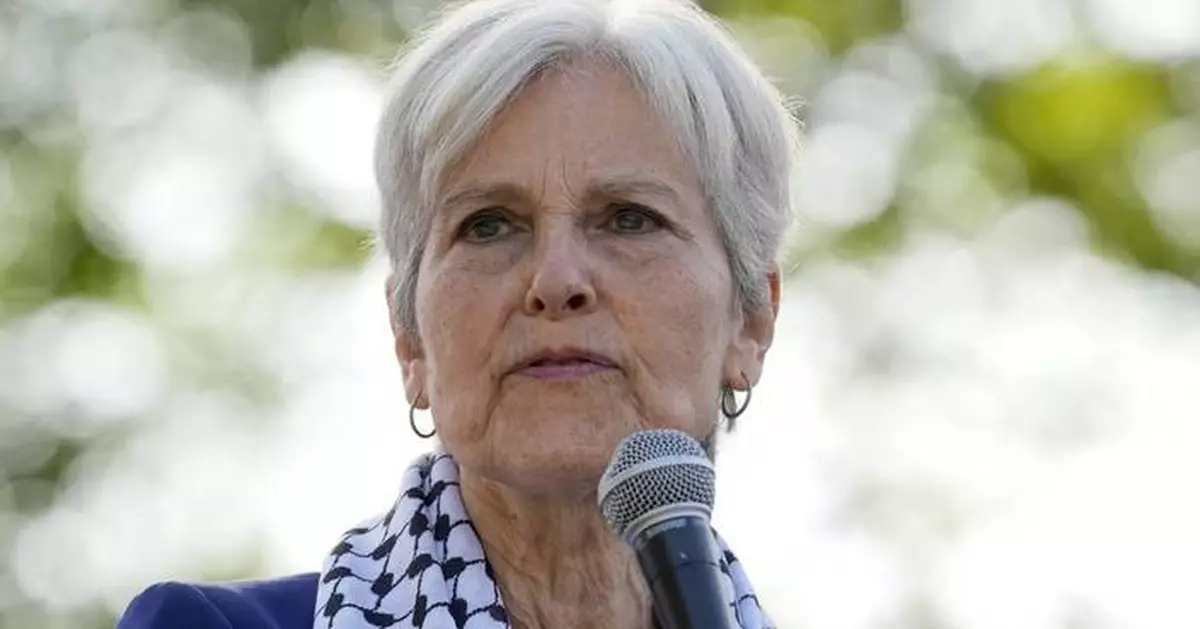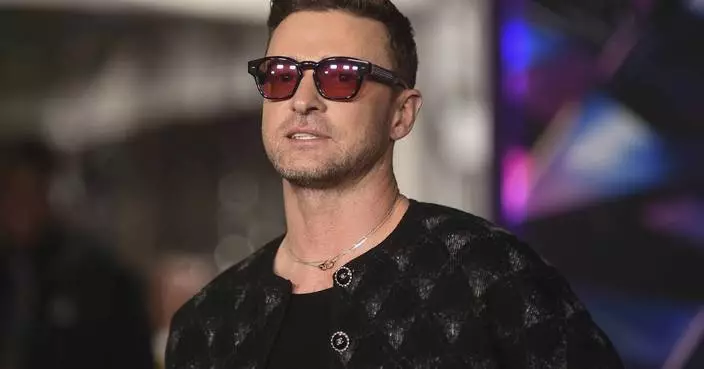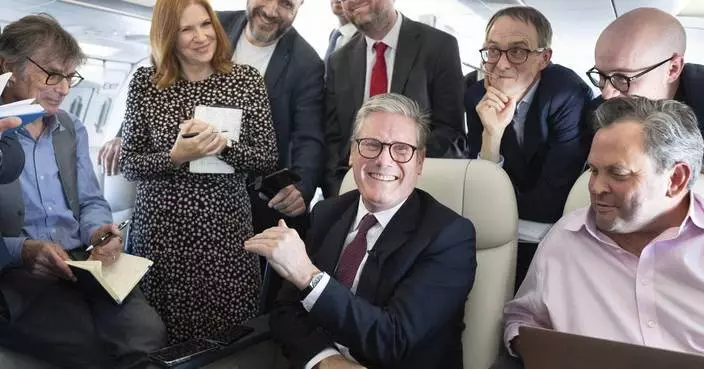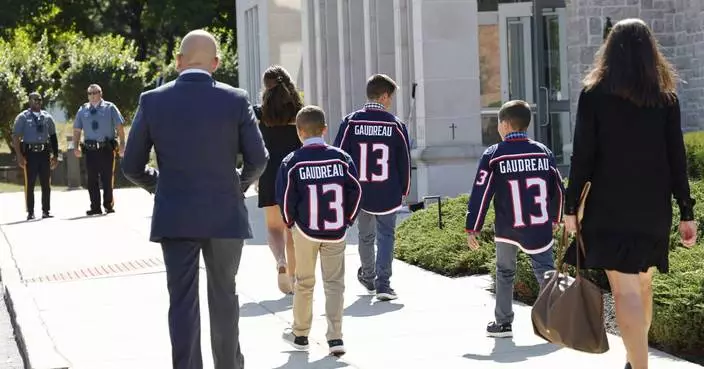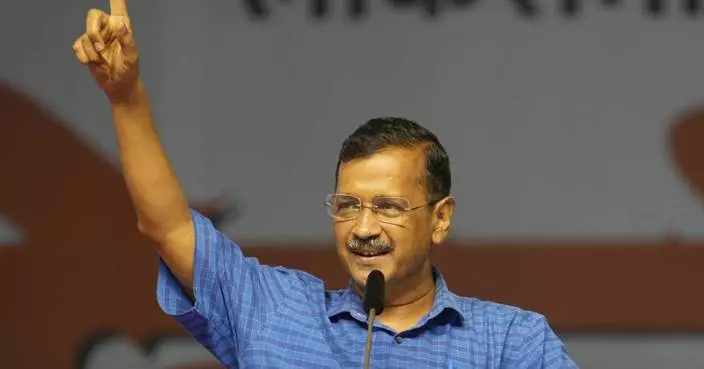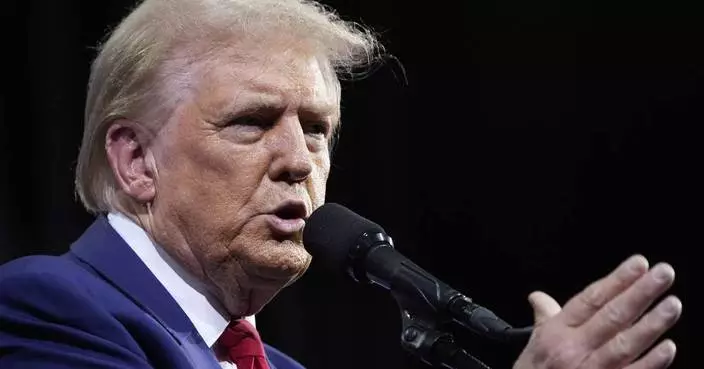MADISON, Wis. (AP) — Green Party presidential candidate Jill Stein will remain on the ballot in the crucial swing state of Wisconsin after the state Supreme Court decided on Monday not to hear a Democratic challenge seeking to oust her.
Democrats are concerned that third-party candidates could draw votes away from Vice President Kamala Harris and help Republican Donald Trump win Wisconsin. The presence of independent and third party candidates on the ballot could be a deciding factor in a state where four of the last six presidential elections have been decided by between 5,700 votes and about 23,000 votes.
The court decided against hearing the challenge brought by David Strange, an employee of the Democratic National Committee, who sought to oust Stein from the ballot. The court did not explain its reasoning.
“We determine that the petitioner is not entitled to the relief he seeks,” the court said in its unsigned order.
Strange argued that the Green Party can’t nominate presidential electors in Wisconsin because the party does not have any state officeholders or legislative candidates authorized to nominate presidential electors.
The Green Party and Republicans countered that the party met all of its legal requirements and that Stein should be allowed to remain on the ballot.
Stein praised the decision, saying the Green Party “beat back the DNC's attack.”
“Today justice prevailed,” she said in a statement.
Michael White, co-chair of the Wisconsin Green Party, called the complaint a “mark of fear by the Democratic Party” and said the attention generated by it had motivated Stein backers.
“It was an inevitable conclusion because the complaint had no merit to begin with and we knew that,” he said.
Democratic National Committee spokesperson Adrienne Watson called the decision “disappointing” and said the Green Party should not be on the ballot.
Stein last appeared on the Wisconsin ballot 2016, when she won just over 31,000 votes — more than Trump’s winning margin of just under 23,000 votes. Some Democrats have blamed her for helping Trump win the state and the presidency that year.
Strange had challenged a Wisconsin Elections Commission decision in February to grant the Green Party ballot access. The commission did so because a candidate from the party won more than 1% of the vote in a statewide race in 2022, meeting a requirement under the law. Sheryl McFarland got nearly 1.6% of the vote while finishing last in a four-way race for secretary of state.
The Wisconsin Elections Commission is scheduled to meet Tuesday to certify which candidates can appear on the ballot. Democrats are also challenging the placement of independent candidate Cornel West on the ballot. A Republican National Committee employee is challenging independent Shiva Ayyadurai’s candidacy.
The Wisconsin Supreme Court kept Green Party presidential candidate Howie Hawkins off the ballot in 2020 after the elections commission deadlocked on whether he filed proper nominating signatures.
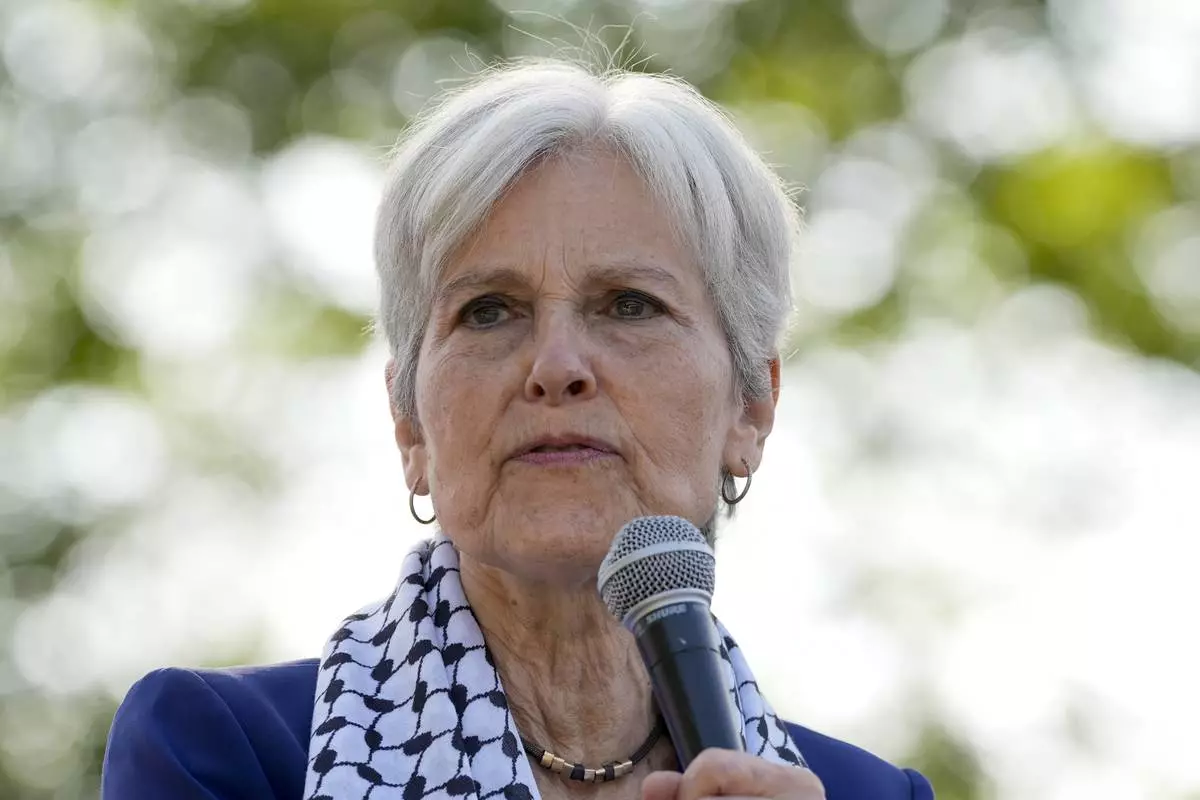
Green Party presidential candidate Jill Stein speaks during a rally at Union Park during the Democratic National Convention Wednesday, Aug. 21, 2024, in Chicago. (AP Photo/Alex Brandon)
Aircraft assembly workers walked off the job at at Boeing factories near Seattle and elsewhere early Friday after union members voted overwhelmingly to go on strike.
Boeing is just the latest business to grapple with union workers over issues including wages and benefits like health care.
Here's a look at some recent company negotiations with their unions.
Late last year the United Auto Workers union overwhelmingly ratified new contracts with Ford and Stellantis, along with a similar deal with General Motors, that would raise pay across the industry and force automakers to absorb higher costs.
The agreements, which run through April 2028, ended contentious talks that began in the summer of 2022 and led to six-week-long strikes at all three automakers.
The new contract agreements were widely seen as a victory for the UAW. The companies agreed to dramatically raise pay for top-scale assembly plant workers, with increases and cost-of-living adjustments that would translate into 33% wage gains.
Top assembly plant workers were to receive immediate 11% raises and would earn roughly $42 an hour when the contracts expire in April of 2028.
Under the agreements, the automakers also ended many of the multiple tiers of wages they had used to pay different workers. They also agreed in principle to bring new electric-vehicle battery plants into the national union contract.
UPS workers that are members of the Teamsters union approved a tentative contract with the package delivery company last year. The run up to the approval was not smooth though, with contentious labor negotiations that threatened to disrupt package deliveries for millions of businesses and households nationwide.
After negotiations broke down in early July 2023, Atlanta-based UPS reached a tentative contract agreement with the Teamsters just days before an Aug. 1 deadline.
At the time the tentative agreement was struck, full- and part-time union workers were set to get $2.75 more per hour in 2023, and $7.50 more in total by the end of the five-year contract. Starting hourly pay for part-time employees also got bumped up to $21, but some workers said that fell short of their expectations.
UPS said at the time that by the end of the new contract, the average UPS full-time driver would make about $170,000 annually in pay and benefits. It was not clear how much of that figure benefits accounted for.
As part of the deal, the delivery company also agreed to make Martin Luther King Jr. Day a full holiday, end forced overtime on drivers’ days off and stop using driver-facing cameras in cabs, among a host of other issues. It eliminated a two-tier wage system for drivers and tentative deals on safety issues were also reached, including equipping more trucks with air conditioning.
Earlier this month video game performers reached agreements with 80 individual games that have signed interim or tiered budget agreements with the performers’ union and accepted the artificial intelligence provisions they have been seeking.
The performers had been striking for over a month.
Members of the Screen Actors Guild-American Federation of Television and Radio Artists began striking in July after negotiations with game industry giants that began more than a year and a half ago came to a halt over AI protections.
The interim agreement secures wage improvements, protections around “exploitative uses” of artificial intelligence and safety precautions that account for the strain of physical performances, as well as vocal stress. The tiered budget agreement aims to make working with union talent more feasible for independent game developers or smaller-budget projects while also providing performers the protections under the interim agreement.
Last month thousands of hospitality union workers on the Las Vegas Strip reached a tentative deal with the Venetian and Palazzo resorts, a first for employees at the sprawling Italian-inspired complex that opened 25 years ago.
The Culinary Workers Union announced on the social platform X that the deal came together after a year of negotiations. It covers over 4,000 hotel and casino workers, from housekeepers and cocktail servers to bartenders and porters.
Bethany Khan, a union spokesperson, said the deal mirrors the major wins secured in recent contracts awarded to 40,000 hospitality workers at 18 Strip properties owned or operated by casino giants MGM Resorts International, Caesars Entertainment and Wynn Resorts.
Those wins included a 32% pay increase over five years, housekeeping workload reductions and improved job security amid advancements in technology and artificial intelligence.
The bump in pay under those contracts will amount to an average $35 hourly wage by the end of the contracts, according to the union. Workers at these properties were making about $26 hourly with benefits before winning their latest contracts in November.
Unions representing 85,000 health care workers reached a tentative agreement with industry giant Kaiser Permanente in October 2023 following a strike over wages and staffing levels.
The deal included setting minimum hourly wages at $25 in California, where most of Kaiser’s facilities are located, and $23 in other states. Workers would also see a 21% wage increase over four years.
The lead up to the tentative agreement included a three-day strike involving 75,000 workers in multiple states.
The tentative agreement also included protective terms around subcontracting and outsourcing, as well as initiatives to invest in the current workforce and address a staffing crisis.
Hollywood’s actors voted to ratify a deal with studios in December 2023 that ended their strike after nearly four months, bringing an official finish to a labor strife that shook the entertainment industry for most of last year.
Members of the Screen Actors Guild-American Federation of Television and Radio Artists approved a three-year contract.
Control over the use of artificial intelligence was the most hard-fought issue in the long, methodical negotiations. The contract called for a 7% general pay increase with further hikes coming in the second and third years of the deal.
The agreement also included a hard-won provision that temporarily derailed talks: the creation of a fund to pay performers for future viewings of their work on streaming services, in addition to traditional residuals paid for the showing of movies or series.
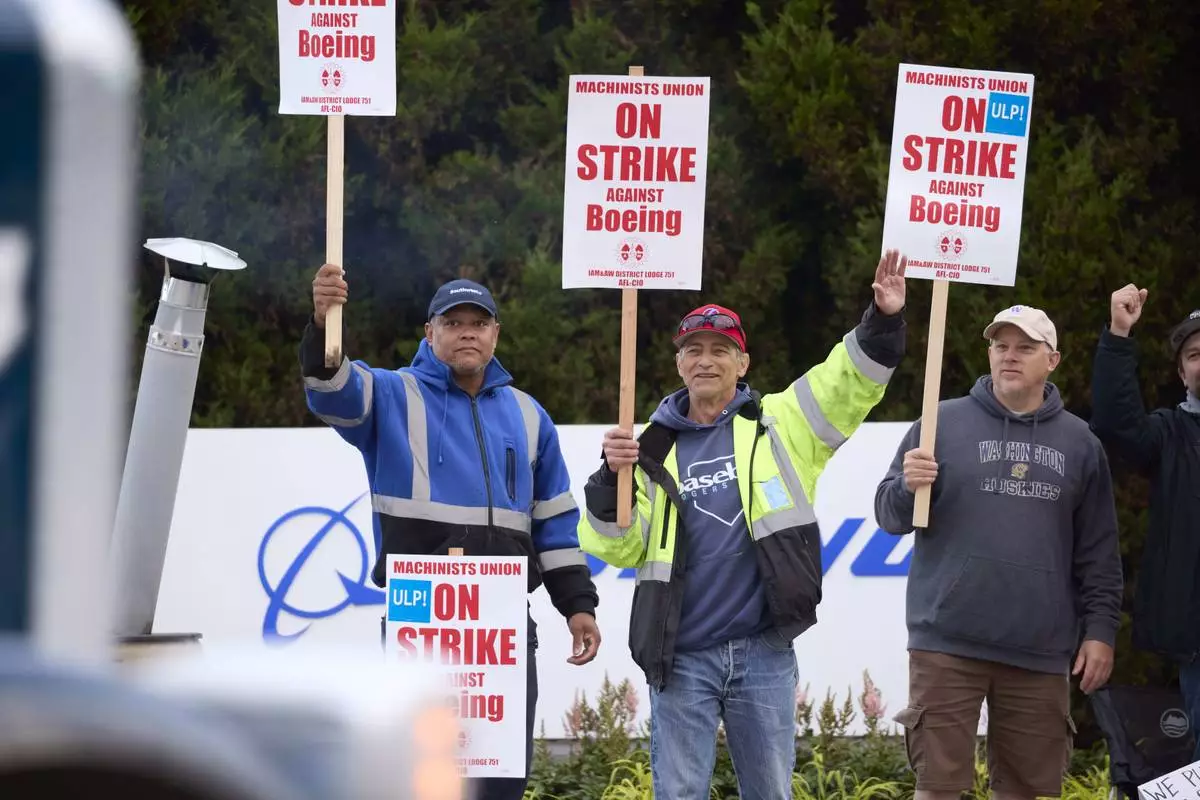
Boeing Machinists Union members Steven Wilson, left, Dave Hendrickson, center,, and Mark Erickson, right, wave to passing traffic while on the picket line at the Renton assembly plant, Friday, Sept. 13, 2024, in Renton, Wash. (AP Photo/John Froschauer)



